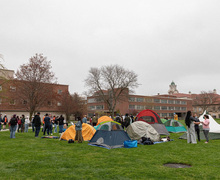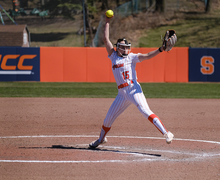‘Love Lies Bleeding’ explores what happens when love goes too far
Xanthe Kakaras | Contributing Illustrator
“Love Lies Bleeding” is a shocking story about gory, codependent queer love. The two characters Lou and Jackie become so obsessed with each other, that they excuse violence.
Get the latest Syracuse news delivered right to your inbox.
Subscribe to our newsletter here.
“Love Lies Bleeding” shocked viewers with a violent and intoxicating queer love. With other fun and lighthearted movies out right now, “Love Lies Bleeding” invites necessary depth and social commentary on the toxicity of love and attachment to the film industry.
Based in New Mexico, the psychological thriller follows two young women, Jackie (Katie M. O’Brian) and Lou (Kristen Stewart). Jackie is thrown into Lou’s chaotic, dangerous family life and the pair cling to each other as their only way to navigate the abuse – developing an unhealthy codependency.
Jackie begins working for Lou’s father, Lou Sr. (Ed Harris), at a local gun range. Her first day on the job, Lou Sr. asks Jackie if she likes guns. Jackie says she prefers not to “hide behind a piece of metal” and likes relying on her own strength. Throughout the film, she displays physical strength, which attracts Lou.
Jackie and Lou meet outside the gym one night. They go home together and, from then on, are attached at the hip, spiraling further into a state of deep and unwithering connection in an uncannily short period of time. They develop an intense, reliant routine, and Lou introduces Jackie to steroids.
The couple remains focused on Jackie’s win at a bodybuilding competition in Las Vegas, with plans to travel there and never come back to New Mexico. They use each other as an escape from reality.
The beginning of the film exposes the toxicity of their relationship as both Lou and Jackie hyperfixate on the upcoming competition in Las Vegas.
Their fleeting honeymoon phase is interrupted when JJ (Dave Franco), Lou’s brother-in-law, disfigures half of his wife (and Lou’s sister) Beth’s face, sending her into a coma. Lou’s visible distress sends Jackie into a state of anger. Feeling a surge of courage from the steroids, Jackie visits JJ at his house and brutally murders him.
When Lou discovers JJ’s death, she hides his body for Jackie, pushing the boundaries of their love to a point of no return. Their relationship transforms from love to obsession.
Jackie and Lou dispose of the body by driving it into a ravine. But, the plot reveals this is the spot of Lou Sr.’s past murder victims, so the couple sets it ablaze. Lou hopes the light from the fire will lead police straight to her father’s criminal record.
While the car containing JJ’s body goes up in flames, Lou and Jackie kiss in front of the explosion. Beyond a strikingly powerful visual, this scene is a testament to their untraditional love story that thrives in the face of violence and death.
On the day of Jackie’s bodybuilder competition, Lou urges her to lay low, but she darts off the first chance she gets. She goes to Las Vegas where her steroid abuse finally catches up to her, and in her drowsiness, she is taken by Lou Sr.
Lou Sr. forces Jackie to kill Daisy (Anna Baryshnikov), Lou’s ex-girlfriend and the only witness to the crime. Jackie fulfills Lou Sr.’s wish and shoots Daisy, thinking she is dead.
This particular killing is against Jackie’s will and she uses a gun, the very item she outwardly disapproved of at the beginning of the movie. The victim of her crime is an innocent woman, representing Jackie’s loss of identity and her inability to use the power of her body, the one thing she has been able to rely on consistently throughout the film.
Jackie’s initial refusal to use weapons at the beginning has come full circle when she shoots Daisy with a gun. This scene represents her deterioration and how steroids – something meant to make her stronger – have only made her weaker.
She fails both mentally and physically. While her mental decay is represented by her murder of Daisy, her body’s failure at the bodybuilding competition shows she can no longer rely on her physical performance either.
In the end, Lou attempts to save Jackie from her father but is caught up when Lou Sr. holds her at gunpoint. “It’s the ones you love the most that will always disappoint you in the end,” Lou Sr. says while aiming the gun at his daughter.
Filled with rage, Jackie’s body enlarges and she picks Lou Sr. off of Lou, leaving him to be arrested. Jackie’s growth develops a fever-dream sense in the movie and an air of confusion between what is real and what is not. In what seems to be a metaphorical action, Jackie contradicts Lou Sr.’s words, using the fully unleashed strength of her body that has become reliable to her again and returning to her true self.
The viewer is left with the last scene in the movie – Lou and Jackie drive off just as they had planned. On the way, Lou opens the trunk of her car to find a still-breathing Daisy. She chokes her to death and disposes of her body in a grass field while Jackie sits in the car and waits.
Here, Jackie and Lou switch roles, Jackie pulling Lou into another world of violence. Up until this point, Jackie is the one committing the murders. Now, it is Lou who needs to continue the violence.
In this film, there is no “good guy.” There is no person for the audience to root for who has an objectively moral compass, making it vastly different in comparison to other horror movies where there is one true and clear villain.
The film shows the viewer that love can make people change in unexpected and dark ways. It articulates the lengths people will go to feel and be loved.
Published on April 2, 2024 at 11:50 pm





